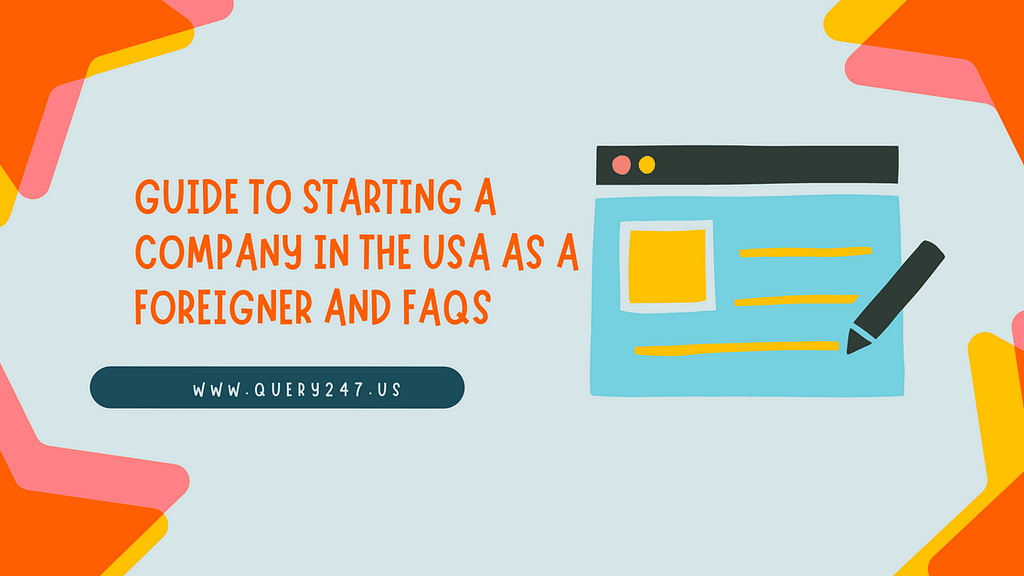Are you a foreign entrepreneur and want to launch your own business in the United States? In this blog post, I’ll cover the various points that you can consider. The land of opportunities welcomes individuals from around the globe to contribute to its dynamic economy.
However, starting a company in the USA as a foreigner involves guiding various legal and practical considerations. In this complete guide, we’ll walk you through the essential steps to turn your business aspirations into reality.

Also Read: Top 50 Profitable Business Ideas for 2024
Launching the journey of starting a company in the USA as a foreigner is undoubtedly challenging, but with thorough research, strategic planning, and compliance with legal requirements, you can turn your entrepreneurial dreams into a successful reality. Remember, each step is a building block towards your business goals in the land of endless possibilities. Good luck!
Understanding the Landscape
Research and Planning:
Before diving into the complexities, conduct thorough studies at the U.S. Marketplace, perceive your target market, know your competition and then go to the next step. A nicely researched marketing strategy may be vital to your fulfilment.
Consider the following points:
- Identify your target market and analyze consumer behaviour.
- Understand local trends, economic conditions, and cultural nuances.
- Develop a solid business plan outlining your goals, target audience, and marketing strategy.
Choosing the Right Business Structure:
Decide on the maximum appropriate enterprise shape for your venture. Options contain sole proprietorship, partnership, business enterprise, or restricted liability employer (LLC). Each shape has its very own set of felony and tax significances. Consider the following points:
- Sole Proprietorship: Simplest structure, but personal assets are at risk.
- Partnership: Shared responsibilities and profits among partners.
- Corporation: Separate legal entity with limited liability.
- LLC: Blends aspects of partnerships and corporations, providing flexibility.
Read Also: Starting a Business in the USA: I Want to Begin But What Should I Sell?
Legal Considerations
Legal Requirements for Foreign Entrepreneurs:
Foreign entrepreneurs must comply with U.S. Legal guidelines and regulations. This includes accepting the necessary licenses and lets in, attaching to nearby zoning laws, and information on federal tax responsibilities. Read the following points carefully:
- Comply with immigration laws and obtain the necessary visa.
- Understand industry-specific regulations and licensing requirements.
- Consider consulting with an immigration attorney to navigate complex legal processes.
Incorporating Your Business:
The process of incorporating a business in the United States includes choosing a state, choosing a business name, and submitting the necessary paperwork to the state government Consider pursuing legal assistance to guide you through this process it goes into the latter. Read the following points:
- Choose a state for incorporation, considering factors like taxation and business-friendly regulations.
- Register your business with the appropriate state authorities.
- Consider hiring a registered agent to manage legal documents and communications.
Employer Identification Number (EIN):
Obtain an EIN from the Internal Revenue Service (IRS). This unique identification is important for tax purposes and for recruitment.
- Apply for an EIN from the IRS online.
- This unique identifier is essential for opening a business bank account, hiring employees, and tax compliance.
Visa Requirements
Business Visa Options:
You may need a business license to operate your business in the United States. Look for options such as E-2 treaty investor visas, L-1 visas for intercompany transfers, or the EB-5 Immigrant Investor Program.
- E-2 Treaty Investor Visa:
- Available for citizens of countries with a treaty of commerce with the USA.
- Requires a substantial investment in a U.S. business.
- L-1 Visa:
- For intracompany transferees, allowing employees to work in a U.S. branch.
- Must have worked for a foreign company for at least one year.
- EB-5 Immigrant Investor Program:
- Grants permanent residency to investors making a significant investment in a new commercial enterprise.
Financial Considerations
Opening a U.S. Bank Account:
Holding a job generally requires U.S. citizenship and bank accounts. Do the research and choose the bank that fits your business needs and offers the services the non-resident worker needs.
- Choose a bank that caters to non-resident business owners.
- Prepare necessary documentation, including EIN, business registration, and personal identification.
Tax Obligations:
Understand your federal, state and local tax obligations. Consult with a tax professional to ensure compliance and maximize your potential benefits.
- Understand federal, state, and local tax regulations.
- Consider hiring a tax professional familiar with international taxation.
- Explore tax incentives and deductions for businesses.
Building a Strong Foundation
Building a Network:
Communication is necessary to productivity. Attend industry events, join local professional groups, network with other entrepreneurs and build a strong support network.
- Attend local business events, workshops, and conferences.
- Join industry-related associations and chambers of commerce.
- Leverage online platforms for networking with professionals in your field.
Digital Presence:
You can establish a strong online presence in today’s digital age. Create a business website, leverage social media, and use digital marketing strategies to reach your target audience.
- Invest in a professional website that reflects your brand.
- Utilize social media platforms to connect with your audience.
- Implement SEO strategies to enhance your online visibility.
Here’s a breakdown of do’s and don’ts when starting a company in the USA as a foreigner:

Do’s:
Do Extensive Market Research:
- Understand the demand for your product or service in the U.S.
- Analyze competition and identify unique selling points.
Do Develop a Comprehensive Business Plan:
- Clearly recap your business goals, target market, and marketing strategy.
- Include financial projections and a risk analysis.
Do Seek Professional Advice:
- Consult with an immigration attorney to navigate visa requirements.
- Hire a business attorney to guide you through the legal aspects of incorporation.
Do Understand Visa Options:
- Explore various visa options and choose the one that aligns with your business goals.
- Comply with visa regulations to maintain legal status.
Do Comply with Legal Requirements:
- Adhere to federal, state, and local regulations.
- Obtain the necessary licenses and permits for your specific industry.
Do Establish a U.S. Bank Account:
- Open a business bank account to facilitate financial transactions.
- Keep clear records of all financial transactions for tax purposes.
Do Invest in Professional Relationships:
- Attend networking events to build connections in your industry.
- Foster relationships with mentors, advisors, and other entrepreneurs.
Do Embrace Digital Marketing:
- Create a professional website with clear information about your business.
- Leverage social media platforms to promote your brand and connect with customers.
Do Stay Informed About Taxation:
- Understand your tax obligations at the federal, state, and local levels.
- Keep track of changes in tax laws and seek professional advice.
Do Cultivate Flexibility and Adaptability:
- Be prepared to pivot your business strategy based on market feedback.
- Embrace changes and adapt to the dynamic business environment.
Don’ts:
Don’t Neglect Market Research:
- Don’t assume that what works in your home country will automatically succeed in the U.S.
- Avoid entering the market without a clear understanding of consumer preferences.
Don’t Overlook Legal Compliance:
- Don’t ignore legal requirements or attempt to operate without the proper permits.
- Avoid cutting corners in the incorporation process; seek professional guidance.
Don’t Ignore Visa Regulations:
- Don’t engage in business activities that violate your visa terms.
- Avoid delays in renewing or extending your visa; plan ahead.
Don’t Neglect Financial Planning:
- Don’t mix personal and business finances.
- Avoid inadequate financial planning; have a contingency fund for unexpected expenses.
Don’t Overlook Cultural Differences:
- Don’t assume a one-size-fits-all approach; be aware of cultural nuances.
- Avoid marketing strategies that may be culturally insensitive or misunderstood.
Don’t Isolate Yourself:
- Don’t underestimate the importance of networking.
- Avoid working in isolation; seek advice from experienced professionals.
Don’t Neglect Digital Presence:
- Don’t underestimate the power of a strong online presence.
- Avoid outdated or unprofessional websites; invest in a quality digital image.
Don’t Delay Tax Compliance:
- Don’t procrastinate on understanding and fulfilling your tax obligations.
- Avoid assuming that your home country’s tax knowledge is sufficient; seek local expertise.
Don’t Fear Change:
- Don’t resist adapting your business model based on feedback.
- Avoid clinging to strategies that prove ineffective in the U.S. market.
Don’t Underestimate the Learning Curve:
- Don’t expect immediate success; entrepreneurship is a journey.
- Avoid frustration; embrace the learning curve and continuously improve.
FAQs
-
What is the process for incorporating a business in the USA as a foreigner?
The process involves choosing a state, selecting a business structure, registering with the state authorities, obtaining an Employer Identification Number (EIN), and complying with local regulations.
-
What types of visas are available for foreign entrepreneurs to start a business in the USA?
Common visas include the E-2 Treaty Investor Visa, L-1 Visa for intracompany transferees, and the EB-5 Immigrant Investor Program. Each has specific eligibility criteria and requirements.
-
Can I operate my business remotely from my home country?
While some business activities can be conducted remotely, certain businesses may require a physical presence. It’s essential to understand the legal and regulatory implications of operating remotely.
-
What are the tax obligations for foreign entrepreneurs in the USA?
Foreign entrepreneurs must comply with federal, state, and local tax regulations. It’s advisable to seek professional advice to understand specific tax obligations and potential incentives.
-
How do I open a U.S. bank account as a non-resident?
Opening a U.S. bank account typically requires an EIN, business registration documents, and personal identification. Choosing a bank that caters to non-resident business owners is crucial.
-
Are there restrictions on foreign ownership of a U.S. company?
In most cases, there are no restrictions on foreign ownership of a U.S. company. However, certain industries may have specific regulations, and compliance is essential.
-
How can I protect my intellectual property when starting a business in the USA?
Intellectual property protection involves registering trademarks, patents, and copyrights. Working with a legal professional to navigate the intellectual property landscape is recommended.
-
Can I hire employees for my U.S. business as a foreign entrepreneur?
Yes, foreign entrepreneurs can hire employees in the USA. However, it’s crucial to comply with employment laws, obtain the necessary work permits, and provide a suitable work environment.
-
What resources are available for networking and support for foreign entrepreneurs in the USA?
Networking events, business associations, and chambers of commerce are valuable resources. Additionally, online platforms and local business groups can provide support and connections.
-
How long does it take to start a business in the USA as a foreigner?
The timeline varies based on factors such as business structure, state regulations, and visa processing times. On average, it may take several weeks to months to complete all necessary steps.
-
Can I bring my family with me when starting a business in the USA?
Depending on the visa type, you may be able to bring your spouse and children with you. It’s essential to understand the family provisions of the specific visa category you choose.
-
What are the key cultural considerations when doing business in the USA?
Understanding communication styles, business etiquette, and cultural nuances is important. Building strong professional relationships and adapting to local business practices contribute to success.
Submit your review | |